China launches national carbon market: Promises – but also pitfalls

On Tuesday 19 December China formally announced the launch of its nation-wide carbon market. However, several questions are still left unanswered.

On Tuesday 19 December China formally announced the launch of its nation-wide carbon market. However, several questions are still left unanswered.

FNI director Geir Hønneland recently took part in a symposium about international law and politics in the Arctic, organized by the Polar Cooperation Research Centre (PCRC) at Kobe University in Japan.
A meeting was held between the Fridtjof Nansen Institute and NIVA for the research project ‘Managing mercury through multilevel governance: Norway and China’ (MERCHINOR), funded by the Research Council of Norway. Other key partners (not present) are Peking University and Tsinghua University.

In the course of 2017, China will be setting up a nation-wide carbon trading market. However, recent developments indicate a watering down of the system, with no real trade or compliance requirements during the first two years of operation.

Aimed at regulating growth in the Norwegian aquaculture industry, the Government’s new ‘traffic light’ system entered into force on 30 October. But are the standards sufficiently stringent to ensure environmentally sound salmon farming?

A breakthrough was achieved at the 7th Session of the Governing Body of the Plant Treaty, held between 30 October and 3 November. After 10 years of negotiations, an expert group was set up to develop options to encourage and guide the implementation of farmers’ rights related to seed and propagating material. FNI contributed substantially to the breakthrough.

The Norwegian climate change whitepaper currently being discussed in the Storting details a strategy for achieving the 2030 emission targets set by the EU, and establishes a framework for closer cooperation with the Union. But what does this mean for Norway?

While largely perceived as a fight over oil resources, clashing assertions of sovereignty and competing maritime claims, the heart of the South China Sea conflict is really all about fish.

The impact of science and business in Arctic environmental politics is an important but understudied field. Fortunately, NUPI and FNI recently presented the first findings of a joint project addressing this puzzle.

With the shared goal of reducing carbon emissions, a delegation from Shanghai and Norwegian experts recently met for a climate and energy roundtable at FNI.

Practicing participatory approaches to plant breeding can help bring about promising new crops for food production - and thus help meet farmers’ and consumers’ needs at the same time.

With the expiry date of the UN 2020 targets on biodiversity approaching, social scientists and policy-makers are joining forces in a new network in which FNI is centrally involved.

A whole series of FNI books, all dealing with Arctic issues, will be published this autumn– a strong testimony to FNI’s academic rigour and cutting-edge research within the field, according to our UK publisher.

Once again, the Fridtjof Nansen Institute (FNI) ranks as the number one most publishing independent research institute in Norway.

Human rights issues, forced migrations and questions of statehood and international law - these topics and more were top agenda when FNI in September opened an international conference on climate change and the Law of the Sea.

With the US leaving the Paris agreement, who can fill the vacancy and lead the international community in the years to come? Will the EU be able to retain its frontrunner position, or will China increasingly be calling the shots, even in global climate politics?

The most recent issue of the Global Environmental Politics (GEP) journal focuses on the design and diffusion of greenhouse gas emissions trading systems (ETS). Several of the articles are outcomes of FNI's ETS Diffusion project.

In what has been labelled 'the Oscars of think tanks', the Fridtjof Nansen Institute (FNI) has been awarded the prize for “best European think tank” in the field of energy and environment.

The Fridtjof Nansen Institute has - once again - been nominated as best European think tank of the year. This year, the institute is nominated in not only one, but in two separate research categories: energy and environment, and international affairs.

FNI will be hosting two events during Arendalsuka in August: One on the 'Duel of Giants', i.e. the role of the EU and China in international climate politics, and one on 'the Blue Battle', Norway's new marine conflicts related to climate change.